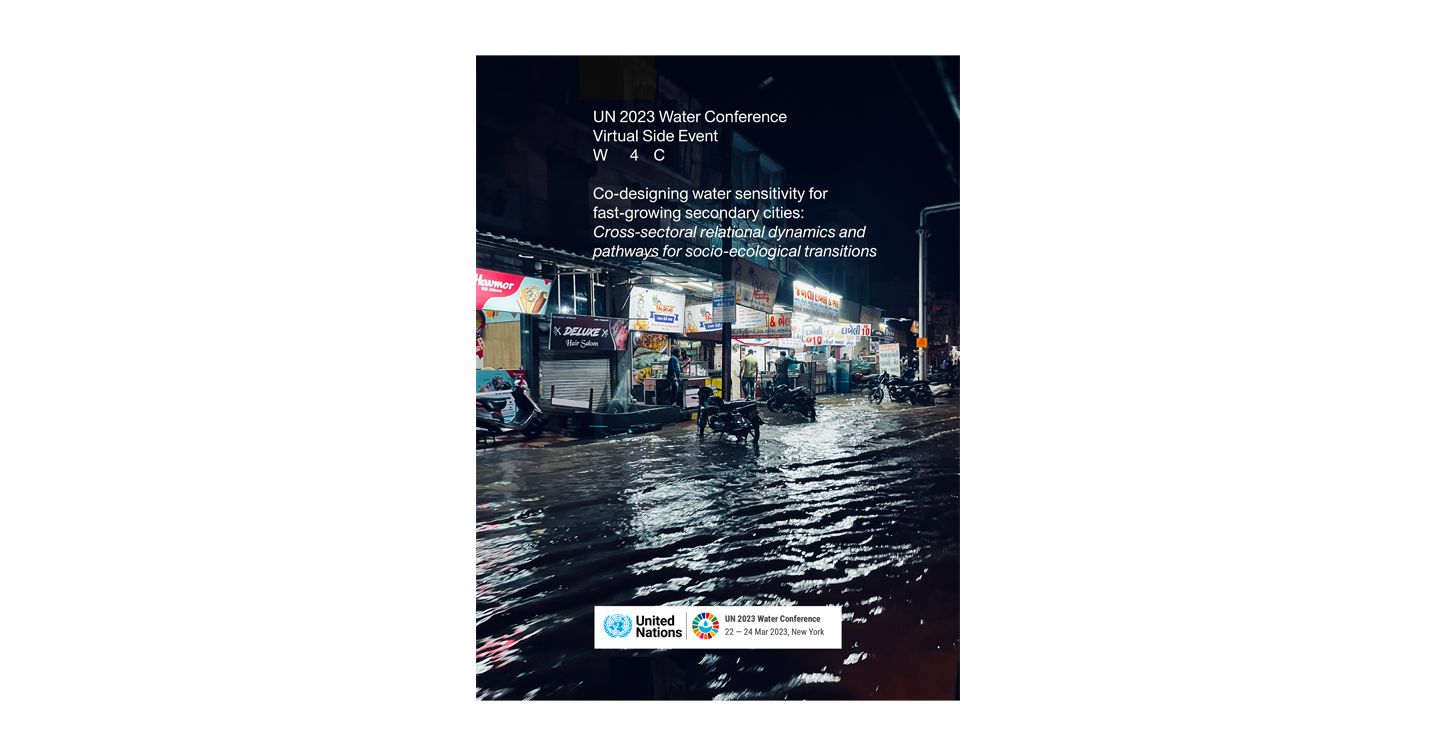UN 2023 Water Conference
Virtual Side Event
Co-designing water sensitivity for fast-growing secondary cities: cross-sectoral relational dynamics and pathways for socio-ecological transitions.
Date:
18 March 2023
09:30-10:30 EST | 14:30-15:30 CET | 19:00-20:00 IST
Virtual Event
Water4Change has the honor to host a side event in the occasion of the UN 2023 Water Conference.
__
The event closes a sequence of transdisciplinary events recently held in different cities in India for co-designing and upscaling pathways and experiments for sustainability transitions in urban water. The first event was held in Delhi, at the India Habitat Center on February 21-22 followed by co-creation workshops in Bhopal, Bhuj, and Kozhikode on February 25, February 28, and March 4.
__
Closing this line of onsite events, this virtual event organized within the framework of UN 2023 Water Conference will discuss a knowledge framework and fit-for-purpose guidelines for co-designing water sensitivity in secondary cities in India: the cross-sectoral dynamic interdependencies, opportunities and barriers for sustainability transitions in the urban water sector. The event will present site-, context-, culture-specific pathways and strategies to accelerate transitions in three secondary cities in India. The cities are (1) capital hinterland (Bhopal), (2) arid City (Bhuj), and (3) coastal City (Kozhikode). These are facing uneven distribution of water pollution, water scarcity, and flooding. Invited speakers will discuss the findings co-produced with local stakeholders at various levels, reflecting on conditions for knowledge transfer and uptake in similar complex and highly dynamic (post-colonial) geographies.
The event is organized by the NWO-DST Water4Change (W4C) Research Programme, co-funded by the Netherlands Organisation for Scientific Research (NWO) and the Indian Government Department of Science and Technology (DST) under the Cooperation India – the Netherlands programme on Water. W4C addresses the complex challenges to urban water systems faced by fast-growing secondary cities. India is a country which is rapidly growing into urban agglomerations showing infrastructure deficits and adaptation gaps in relation to current and future climatic, societal and economic change. Water stress throughout India results yearly in serious problems of water shortages, flooding, pollution and ecosystem damage. In fast-growing secondary cities in India there is a wide variability of these impacts, showing the geographical and contextual reasons behind of potentially contaminated sites, as well as management of water resources. Additional challenges being faced by cities are rapid urbanisation, demands for climate adaptation, shift from a traditional linear organisation to co-production among different stakeholders and the need for experimentation/ open innovation fostering new economic models. These make political agreement on priorities difficult to achieve without improved information and understanding, particularly about the site-specific dynamics that could contribute or counteract urban water systems regeneration, climate change mitigation, adaptation and the sustainable management of water resources.
The event focuses in framing the dynamic interdependencies, synergies and trade-offs across sectors, scales, actors and stakeholders (agents of change). Ultimately, the event aims to foster discussions on societal transitions needed to incrementally achieve water sensitivity – responsive to on-ground hydro-cultural practices, governance capacities, and the optimal use of existing technologies.
__
About the UN 2023 Water Conference
In March 2023, there will be a unique occasion, for the first time in more than 40 years, the General Assembly of the United Nations will debate the challenges of the water domain sector and related Sustainable Development Goals.
Water is a fundamental part of all aspects of life. Water is inextricably linked to the three pillars of sustainable development, and it integrates social, cultural, economic and political values. It is crosscutting and supports the achievement of many SDGs through close linkages with climate, energy, cities, the environment, food security, poverty, gender equality and health, amongst others. With climate change profoundly affecting our economies, societies and environment, water is indeed the biggest deal breaker to achieve the internationally agreed water-related goals and targets, including those contained in the 2030 Agenda for Sustainable Development.
The Conference, co-hosted by the Governments of Tajikistan and the Netherlands, will feature an opening and closing ceremony, six plenary meetings and five multi-stakeholder interactive dialogues. It will also feature a number of high-level special events and side events organized by Member States, the UN system and other stakeholders.
___
UN 2023 Water Conference Virtual Side Events Full Programme
Programme
__
09:30-09:35 (EST)
Welcome, W4C introduction
__
PANEL 1
09:35-09:40 (EST)
Co-Producing Water Sensitivity – Knowledge transfer design and findings
__
09:40-09:50 (EST)
Transition Pathways: Towards Water Sensitivity – Bhopal
__
09:50-10:00 (EST)
Transition Pathways: Towards Water Sensitivity – Bhuj
__
10:00-10:10 (EST)
Transition Pathways: Towards Water Sensitivity – Kozhikode
__
PANEL 2
Joint Panel discussion between 3 Cities – Bhopal, Bhuj, Kozhikode
__
10:10-10:25 (EST)
Upscaling lessons, future actions (Water Agenda)
__
10:25-10:30 (EST)
Closing remarks and reflections
A Programme supported by:

Partner Institutions:













